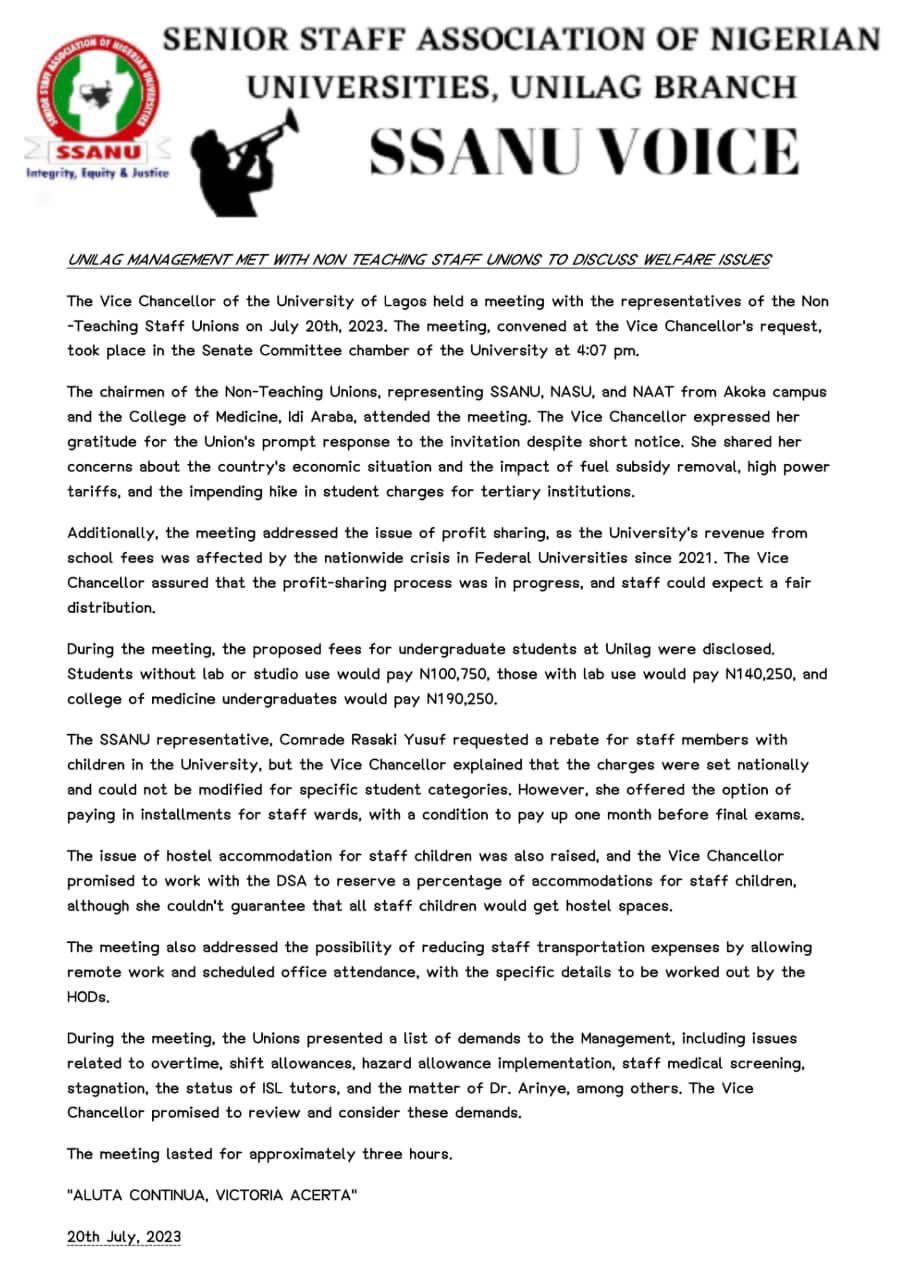On July 20th, 2023, the University of Lagos (Unilag) held a meeting with representatives from the Non-Teaching Staff Unions, including the Senior Staff Association of Nigerian Universities (SSANU), the Non-Academic Staff Union (NASU), and the National Association of Academic Technologists (NAAT). The meeting was convened by the Vice Chancellor to discuss various welfare issues, including the alleged hike in school fees, profit sharing, staff benefits, and other demands. This article will delve into the details of the meeting and shed light on the concerns raised by SSANU and the potential implications for the university community.

The Alleged School Fees Hike
One of the primary issues discussed during the meeting was the proposed increase in school fees for undergraduate students at Unilag. According to the information disclosed, students without lab or studio use would be required to pay ₦100,750, those with lab use ₦140,250, and college of medicine undergraduates ₦190,250. This alleged increase sparked concerns among the Non-Teaching Staff Unions, particularly SSANU, who were quick to address the issue.
The Impact of Economic Factors
During the meeting, the Vice Chancellor expressed her concerns about the prevailing economic situation in the country. The removal of fuel subsidies, high power tariffs, and the impending hike in student charges for tertiary institutions were cited as factors influencing the university’s revenue and financial decisions. It is crucial to consider the broader economic context within which the university operates to understand the rationale behind the proposed school fee increment.
Profit-Sharing Process
Another important issue discussed was the profit-sharing process in the University. The nationwide crisis in Federal Universities since 2021 has adversely affected the revenue generated from school fees. The Vice Chancellor assured the Non-Teaching Staff Unions that the profit-sharing process was underway, and a fair distribution could be expected. This assurance was likely aimed at addressing concerns about the impact of the crisis on staff benefits and welfare.
SSANU’s Requests and the Vice Chancellor’s Response
Comrade Rasaki Yusuf, the SSANU representative, made a request for a rebate for staff members with children enrolled in the University. However, the Vice Chancellor explained that the charges were set nationally and, therefore, could not be modified for specific student categories. Despite this, she offered the option of paying in installments for staff wards, with a condition to pay up one month before final exams. The issue of hostel accommodation for staff children was also raised, and the Vice Chancellor promised to work with the Dean of Student Affairs (DSA) to reserve a percentage of accommodations for staff children, although she couldn’t guarantee that all staff children would receive hostel spaces.
Remote Work and Staff Transportation Expenses
As a potential solution to reduce staff transportation expenses, the possibility of allowing remote work and scheduled office attendance was discussed during the meeting. The specific details of this proposal were to be worked out by the Heads of Departments (HODs). This initiative could potentially alleviate some financial burdens on staff members and improve work-life balance.
Other Demands and Promises
In addition to the school fees issue and staff transportation expenses, the Unions presented a list of demands to the Management. These included concerns related to overtime, shift allowances, hazard allowance implementation, staff medical screening, stagnation, the status of ISL tutors, and the matter of Dr. Arinye, among others. The Vice Chancellor pledged to review and consider these demands, demonstrating a willingness to engage with the Non-Teaching Staff Unions and address their concerns.
Conclusion
The meeting between the University of Lagos’ Vice Chancellor and the Non-Teaching Staff Unions shed light on various welfare issues faced by university employees. The alleged hike in school fees and the impact of economic factors on the institution’s finances were among the key concerns discussed during the meeting. SSANU and other Unions voiced their demands, and the Vice Chancellor promised to address these concerns. As the situation unfolds, it remains essential for all stakeholders to engage in open dialogue and work towards solutions that uphold integrity, equity, and justice within the university community.



Leave a Comment